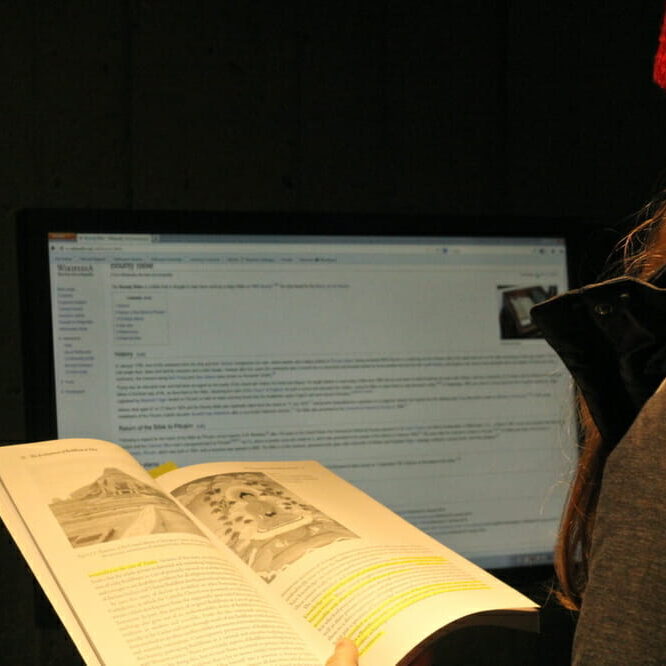

Print books offer an intensely physical interaction—useful when reading for school. (Photo by Deborah Oomen)
I know what you’re thinking. You read the title of this article and thought, “Great. Here she goes again, that crazy opinions editor, ranting on about e-books and print.” And I acknowledge that you may have a right to groan. But I’ve dreamed up a new angle and I just had to share it with you.
The conversation around e-books or print changes in the context of an academic library. Our relationship with the books we use for scholarly purposes is very different from the books we read purely for leisure. While I can’t speak for all readers, I can attest that when I’m reading a book for school, I underline, highlight, sticky-note and generally marginalia-ize the heck out of that text. It’s an incredibly physical interaction: I’m scribbling all over the place, leaning right over the desk with my nose on the page, flipping back and forth from paragraph to footnote, bibliography to figure seven, back to my paragraph again. I’m getting exhausted just writing about it.
For the most part, e-books are completely incompatible with this style of reading. The footnotes aren’t on the same page, and it’s prohibitive to move between pages. The viewing page numbers don’t match the actual page numbers. The pages take forever and a day to load. And most of the time, the interface looks like a parody of itself, cumbersome and butt-ugly. The writing has to be very, very engaging for me to want to continue looking at that screen.
Moving into the realm of the virtual also means the physicality of reading is taken away. Gone are my sticky notes poking out the side and my marginalia. If I want notes, they have to be written down (or typed) on a separate page. At best, e-reading mediums will allow you to write a virtual note that gets tagged to the page, then hidden away. It’s not going to grab my attention when I’m “flipping” through the book next time: if I want it, I have to conceptualize, rather than view it, to know it’s there. (New angle: e-books will make us all better philosophers?)
Sure, e-books allow more students to access a text at one time. There’s also the advantage of conducting research from your living room, but for me the trek to the library is almost always worth it. As an upper-year humanities student, that walk—and my intensely physical interactions with print books—is the only exercise I get.






